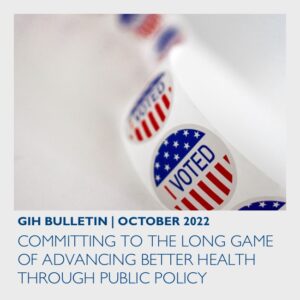Cara V. James, PhD, President and CEO, Grantmakers In Health
Every year around this time, we participate in a time-honored process of voting for candidates we believe align with our values. As people across the country prepare to vote in state and local elections, those of us working in health philanthropy should take a moment to reflect on what we can do to support policies to advance better health outcomes. It is important not to be discouraged by political polarization—there are still many opportunities for bipartisan cooperation, especially where there is broad public consensus. Now more than ever, it is important for us to find ways to bridge our growing divides and work together for the collective good.
I recently attended the White House Conference on Hunger, Nutrition, and Health, where a bipartisan private- and public-sector coalition from across the United States pledged more than $8 billion in commitments to support the administration’s ambitious vision for eliminating hunger by 2030. Three GIH Funding Partners—Blue Cross and Blue Shield of North Carolina Foundation, Nemours Children’s Health, and Novo Nordisk—were among them. Partnerships such as this are critical in making real and lasting change and illustrate the potential for coalition-building around policy.
As detailed in our 2025 strategic plan, GIH is bringing funders together to use our collective voice to advance policies that support better health for all. Our upcoming Fall Forum will put a spotlight on policy advocacy opportunities in four of our strategic plan’s focus areas—access and quality, community engagement and empowerment, health equity and social justice, and population health.
Opportunities to advance health through Medicaid and CHIP will be among the topics we will discuss at the Fall Forum. As my colleagues and I discussed in a recent JAMA article, Medicaid provides coverage for many of our nation’s most vulnerable populations and has an important role to be played in advancing health equity. Chiquita Brooks-LaSure, Administrator of the Centers for Medicare & Medicaid Services (CMS), will offer insights into opportunities for health funders to engage with government on Medicaid and Medicare policy at the Fall Forum’s Lauren LeRoy Health Policy Lecture. We will also have discussion on specific areas of opportunity in Medicaid and CHIP, including maternal health, mental and behavioral health, addressing the social determinants of health, and the end of the public health emergency featuring policy experts from CMS, the National Academy for State Health Policy, and elsewhere.
As part of our ongoing efforts to develop GIH’s policy agenda, we held a series of in-person and virtual focus groups to learn about your policy priorities and get feedback on where you’d like to see GIH concentrate our efforts. One common thread that emerged from those conversations is the importance of greater civic engagement in a time of polarization. The Fall Forum will place a special emphasis on community organizing. Reverend Alvin Herring, Executive Director of the Faith in Action Network, will headline a session on using community organizing to build power and advance health equity. We will also delve into the art and science of community organizing and hear from a panel of veteran community organizers working to advance social justice about changing dynamics, emerging opportunities, and future directions.
We will continue these conversations into 2023 and beyond. As we begin to use our voice in the policy space, we want to continue to hear your thoughts about the best vehicles for bringing the health philanthropy community together in partnership with private and public actors to develop this important work. We’re especially interested in approaches to creating funding collaboratives around these issues. This is an exciting opportunity to take health philanthropy forward and deliver lasting improvements to health.
Finally, it’s important to acknowledge that policy change—especially at the federal level—doesn’t happen overnight. It is often a long game that requires committed leadership, long-term strategies, and continuous engagement to be successful. We view the Fall Forum and other GIH convenings as critical steps along a path towards change. As we prepare to unveil GIH’s policy agenda, we recognize that this is only a starting point. We will be building on this work for months and years to come and hope that you will join us in our steadfast commitment to the long game and this critical effort to advance better health for all through effective public policy.

